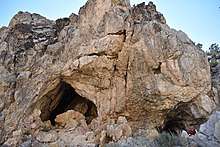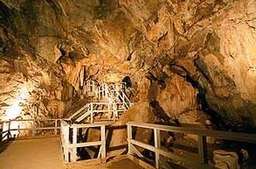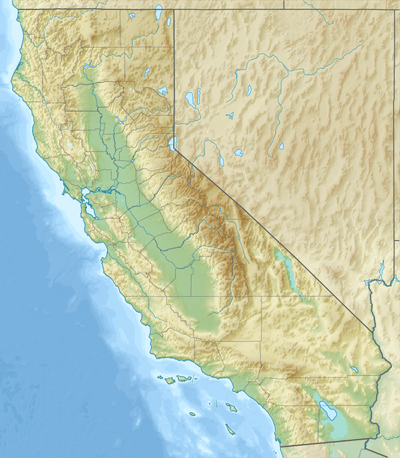Mitchell Caverns
Mitchell Caverns, within the Mitchell Caverns Natural Preserve, is a pair of solution limestone caves, located on the east side of the Providence Mountains at an elevation of 4,300 feet (1,300 m), within the Providence Mountains State Recreation Area. It is located in the Mojave Desert, in San Bernardino County, California.
| Mitchell Caverns | |
|---|---|
 | |
 | |
  | |
| Location | San Bernardino County, California, United States |
| Coordinates | 34°56′27″N 115°30′52″W[1] |
| Elevation | 4,300 feet (1,300 m) |
| Geology | Permian limestone |
| Access | Show cave, Open Fri-Sun |
| Visitors | 15 People Per tour |
| Website | http://www.parks.ca.gov/?page_id=615 |
| Designated | 1975 |
Geology
The caves lie within a thick sequence of marine Permian limestone.[2] They were formed before the Pleistocene epoch, when ground water with a high carbonic acid content ate into the surrounding sedimentary limestone. Stalactites, stalagmites, and other cave formations were formed from calcium carbonate left by dripping mineral water.
History
Numerous paleontological and archaeological finds have been made in and around the caverns. Scientists have found the remains of several prehistoric animals, including a Shasta ground sloth. The caverns were a special place for the Chemehuevi Indians, and a number of tools and material culture have been found. The Chemehuevi knew the caves as "the eyes of the mountain" due to their easily spotted dual entrances located on the side of the mountain.
The caverns are named after Jack and Ida Mitchell, who owned and operated the caves from 1934 to 1954 as a tourist attraction and rest stop for travelers on nearby U.S. Route 66. The Mitchells also held mining rights to the area and dug several prospect holes and tunnels, some of which are still visible.
The area became a state park in 1956. The surrounding lands became a part of the National Park Service Mojave National Preserve in 1994, but the caves are still owned and operated by the state of California.
Cavern tours
The "Tecopa" and "El Pakiva" caves are connected by a man-made tunnel and are open to guided tours led by California State Park rangers. These caves are the only limestone caves in the California State Park system.[3]
In January 2011, due to California's budget crisis, all tours were suspended and the Providence Mountains State Recreation Area closed.[4] Vandalism plagued the caverns' visitor center and installations after their closure.[5]
Over a long period, major infrastructure upgrades took place. Mitchell Caverns and Providence Mountains SRA reopened, and the caverns resumed tours, on November 3, 2017, after being closed for nearly seven years.[6][7]
References
- "Mitchell Caverns Natural Preserve". Geographic Names Information System. United States Geological Survey. Retrieved 2012-12-16.
- Aalbu, Rolf (July 1989). "An Analysis of the Coleoptera of Mitchell Caverns, San Bernardino County, California" (PDF). National Speleological Bulletin. 51 (1): 1–10. Retrieved 26 October 2017.
- http://www.parks.ca.gov/?page_id=615.
- "Providence Mountains State Recreation Area". California Department of Parks and Recreation.
- Louis Sahagun (February 25, 2012). "Shuttered California state parks may be vulnerable to vandalism". Los Angeles Times. Retrieved 2012-05-05.
- "Magical Mitchell Caverns finally reopening in Mojave Desert". Press Enterprise. 2017-10-23. Retrieved 2017-10-23.
- "Reopening" http://www.parks.ca.gov/?page_id=615
- http://Desertusa.com - Mitchell Caverns article.
- Robert P. Sharp and Allen F. Glazner, Geology Underfoot in Southern California, Missoula Mont: Mountain Press, 1993.